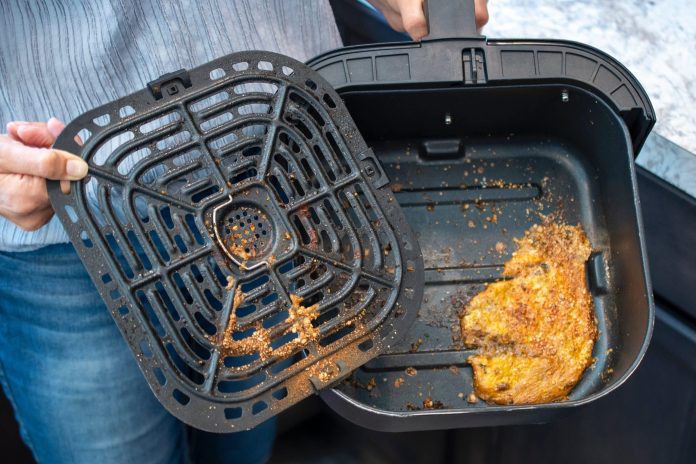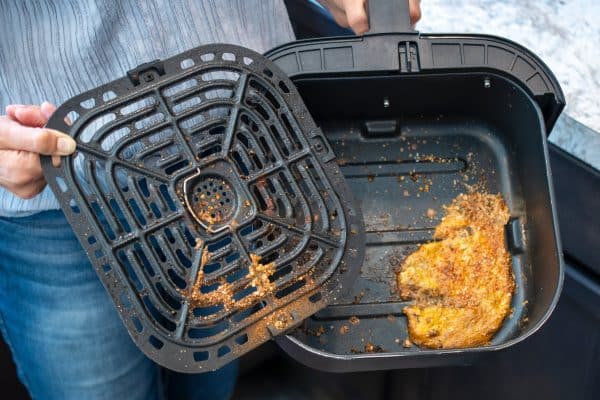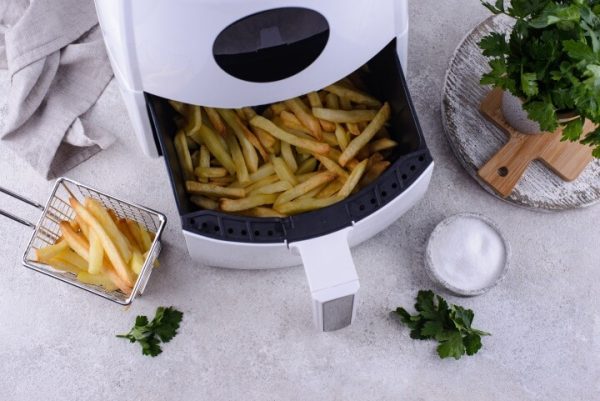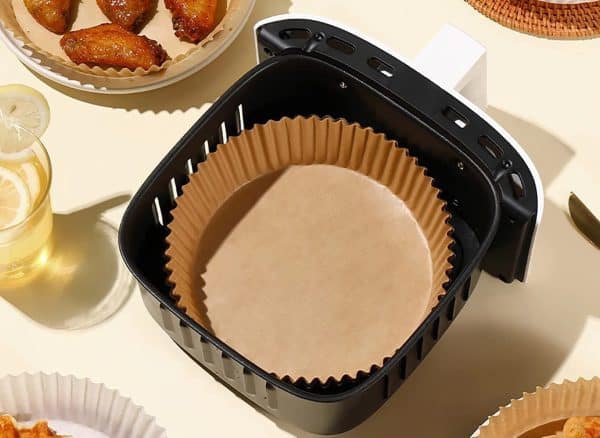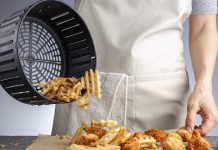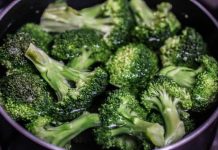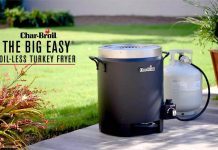Have you ever experienced the frustration of unevenly cooking food from your beloved air fryer?
We feel your pain! In this article, we will guide you through some simple yet effective tips to ensure perfectly cooked dishes every time you use your air fryer.
We’ve got you covered, from arranging food properly to adjusting cooking times. So, let’s dive in and discover the secrets to preventing that dreaded uneven cooking in the air fryer!
This image is the property of i.insider.com.
Preheating the Air Fryer
Importance of preheating
Preheating the air fryer is essential in achieving perfectly cooked and evenly browned food. Preheating ensures the air fryer reaches the desired cooking temperature before placing the food inside. This allows for more consistent cooking and helps to seal in the flavors.
How to preheat the air fryer
To preheat the air fryer, set the desired temperature on the appliance and let it run for a few minutes until it reaches the correct temperature. Most air fryers have a preheat function, making this process even more accessible. Alternatively, you can manually set the temperature and let the air fryer heat up.
Time and temperature for preheating
The preheating time and temperature may vary depending on the model and the specific recipe. Generally, preheating the air fryer for around 3-5 minutes at a temperature of 350°F (175°C) should be sufficient for most recipes. However, it’s always a good idea to consult the recipe instructions for the recommended preheating time and temperature.
Choosing the Right Size of Food
Impact of food size on cooking
The size of the food you put into the air fryer can significantly affect the cooking process. If the pieces are too large, they may not cook evenly, leaving some parts undercooked and others overcooked. On the other hand, if the pieces are too small, they may cook too quickly and become dry or burnt.
Cutting food into uniform pieces
To ensure even cooking, cutting the food into uniform pieces is essential. This allows the hot air to circulate evenly around each piece of food, ensuring they all cook simultaneously. Try to cut the food into similar sizes and shapes, whether it’s vegetables, meat, or other ingredients.
Using cooking racks or trays
Another way to achieve even cooking is by using racks or trays in the air fryer. These accessories provide better air circulation and prevent the food from touching the bottom of the basket, allowing for more even browning. They also make removing the food from the air fryer easier and prevent it from sticking to the basket.
Arrangement of Food in the Air Fryer
Avoid overcrowding the basket.
One common mistake when using an air fryer is overcrowding the basket. Overcrowding can restrict the airflow, leading to uneven cooking. It is essential to leave enough space between the food items to allow the hot air to circulate freely. If necessary, cook in multiple batches instead of cramming all the food into one batch.
Staggering the food
Staggering the food in the air fryer basket can also help promote even cooking. Placing larger pieces at the bottom and smaller ones on top ensures that everything cooks evenly. This way, the smaller pieces won’t get overcooked while waiting for the larger ones to cook.
Using a foil sling
When cooking more significant pieces of food, such as a whole chicken, using a foil sling can help the cooking process. Create a sling by folding a strip of aluminum foil and placing it under the food before placing it in the air fryer. This will make it easier to lift the food out when it’s done and prevent the food from sticking to the bottom of the basket.
Flipping and Shaking the Food
Why flipping and shaking is important
Flipping and shaking the food during cooking is crucial for even browning and preventing any parts from becoming too crispy or burnt. Flipping the food allows both sides to cook evenly, while shaking helps to redistribute the food, ensuring that all parts are exposed to the hot air.
When to flip and shake
The timing for flipping and shaking will depend on the specific recipe and the type of food you’re cooking. As a general rule of thumb, it’s a good idea to flip the food about halfway through the cooking time. For foods that require a longer cooking time, such as chicken wings, it’s recommended to shake the basket every 5-10 minutes to ensure even browning.
Proper technique for flipping and shaking
When flipping the food, use tongs or a spatula to carefully turn each piece over without damaging the coating or crust. When shaking the basket, hold it securely and give it a gentle shake to redistribute the food. Be cautious not to shake too vigorously, as this may cause the food to fly out or become unevenly distributed.
This image is the property of i.insider.com.
Using Oil or Cooking Spray
Applying oil or cooking spray to food
Oil or cooking spray is an optional step that can enhance the flavor and texture of your air-fried food. It can also help prevent sticking and promote even browning. To apply oil or cooking spray, lightly coat the food with a small amount before placing it in the air fryer basket.
Which oils to use
When choosing oils for air frying, opting for oils with a high smoke point is best. These oils can withstand high temperatures without breaking down or producing smoke. Some suitable oils for air frying include canola, vegetable, peanut, and avocado. Avoid using oils with low smoke points, such as olive oil or butter, as they may produce smoke or burn.
How much oil to use
The oil needed will depend on the specific recipe and personal preference. Generally, it’s best to use minimal oil to prevent excessive greasiness. A light spritz of cooking spray or a drizzle of oil using a brush can be sufficient for most recipes. Remember that you can always add more oil if needed, but it’s difficult to remove excess oil once it has been applied.
Choosing the Right Temperature
Impact of temperature on cooking
The temperature setting plays a crucial role in even cooking in the air fryer. Cooking at the proper temperature ensures the food is cooked thoroughly without being undercooked or overcooked. It also affects the browning and crispiness of the food’s exterior.
Adjusting temperature for different foods
Different foods require different temperature settings to achieve optimal results. It’s essential to refer to the recipe instructions or recommended cooking temperature guidelines provided by the air fryer manufacturer. Lighter and delicate foods, such as fish or vegetables, may require lower temperatures, while denser meats or breaded items might require higher temperatures.
Recommended temperature range
For most air fryer recipes, a temperature range of 320°F (160°C) to 400°F (200°C) is typically recommended. However, it’s crucial to adjust the temperature based on your specific air fryer model and the cooked food type. Some air fryers may have slight variations in temperature accuracy, so it’s always a good idea to monitor the food closely for desired doneness.
This image is the property of content-images.thekrazycouponlady.com.
Using Cooking Accessories
Benefits of using cooking accessories
Using cooking accessories in the air fryer can significantly enhance the cooking experience and result in more even cooking. Cooking accessories such as baking pans, grill grates, or skewers offer versatility and allow you to cook a more comprehensive range of foods. They can also help elevate the food, allowing for better air circulation and preventing it from sitting in its juices.
Examples of useful accessories
There are various accessories available for air fryers that can improve cooking results. Baking pans or trays are helpful for cooking items like pizzas or cakes, while grill grates can add grill marks to meats and vegetables. Skewers are perfect for making kabobs or roasting smaller items. Air fryer-specific cookbooks often provide suggestions and recipes tailored explicitly for these accessories.
Proper usage of accessories
Following the manufacturer’s instructions and guidelines is essential when using cooking accessories. Ensure the accessories fit correctly within the air fryer and don’t block the airflow. Avoid overcrowding the accessories, as this can hinder the cooking process. It’s also essential to adjust cooking time and temperature accordingly when using different accessories compared to the air fryer basket.
Rotating or Reversing the Food
Tips for rotating food during cooking
Rotating the food during cooking helps ensure that all parts are evenly exposed to the hot air. To rotate the food in the air fryer, use tongs or a spatula to turn the pieces over or switch their positions within the basket. This technique can benefit more oversized items or if you notice uneven browning.
Reversing the positions of food
Similarly, reversing the positions of the food within the air fryer basket can also help achieve more even cooking. For example, if one side of the basket tends to have hotter spots, moving the food from the hotter side to the cooler side can help distribute the heat more evenly.
Effectiveness of rotation and reversal
By rotating or reversing the food, you increase the chances of achieving evenly cooked results. However, it’s important to note that the effectiveness of these techniques may vary depending on factors such as the air fryer model, food type, and cooking time. Monitoring the food closely and adjusting as needed will help ensure the best outcome.
This image is the property of airfryermasterchef.com.
Monitoring and Adjusting Cooking Time
Importance of monitoring cooking time
Monitoring the cooking time is crucial to prevent undercooked or overcooked food. It’s essential to follow the recipe instructions for the recommended cooking time. However, it may vary depending on the air fryer model, food quantity, and thickness.
Factors affecting cooking time
Several factors can affect the cooking time in an air fryer. The food’s thickness and size, the ingredients’ starting temperature, and the air fryer’s temperature can all impact the cooking time. Additionally, placing chilled or frozen food in the air fryer may require more cooking time than room temperature ingredients.
How to adjust cooking time
If you notice that the food is not cooked evenly, it may be necessary to adjust the cooking time. Extend the cooking time if the food is undercooked, and reduce the cooking time if it is overcooked or browning too quickly. Determining the ideal cooking time for a specific recipe or ingredient in your air fryer may require trial and error.
Troubleshooting Uneven Cooking
Identifying the cause of uneven cooking
Uneven cooking can occur for various reasons, and identifying the cause is the first step in finding a solution. Take note of the specific undercooked or overcooked areas and consider factors such as overcrowding, uneven temperature distribution, or improper food preparation.
Possible solutions for uneven cooking
To address uneven cooking, there are several possible solutions. Use the tips mentioned earlier, such as avoiding overcrowding the basket, flipping and rotating the food, and adjusting cooking time and temperature as needed. Additionally, check for any signs of malfunction in the air fryer itself, such as uneven heating elements or airflow, and consult the manufacturer’s troubleshooting guide if necessary.
When to seek professional help
If you continue to experience consistent uneven cooking despite your best efforts or suspect a malfunction in your air fryer, it may be necessary to seek professional help.
Contact the manufacturer or an authorized service center to address technical issues or concerns. They will be able to provide further guidance and assistance to ensure the optimal performance of your air fryer.
In conclusion, even cooking in the air fryer involves various factors such as preheating, food size, arrangement, flipping and shaking, oil usage, temperature selection, cooking accessories, rotation and reversal, cooking time adjustment, and troubleshooting.
By following these tips and techniques, you can maximize the potential of your air fryer and enjoy delicious and evenly cooked meals every time. Happy air frying!
This image is the property of storables.com.

